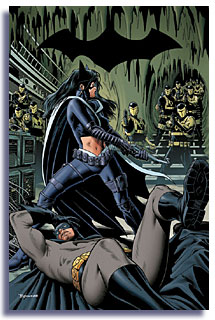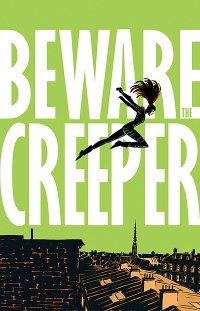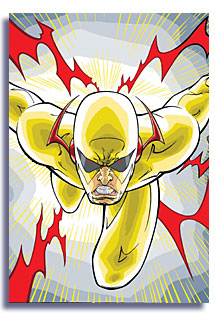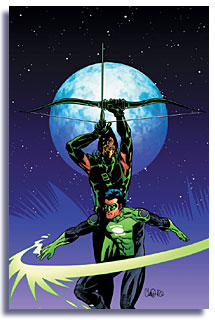|
Hey
Kids! Comics!
Batman:
Gotham Knights #40
writer: Scott Beatty
artists: Roger Robinson and John Floyd
The latest
chess game between Dark Knight and Checkmate draws to a close.
Both sides think they've won, and it's cost them. Along the
way, The Huntress transitions into a uniform that's hotter
for artists like Jim Lee and Ed Benes to draw.
Unfortunately,
it feels like the "A" plot existed just to bring us to that
point. Playing underneath it, though, is Alfred's terrible
illness, which may or may not have lasting repercussions.
At the very least, it lays the groundwork for Batman to reflect
further on his choices in life: first Lucius Fox, allegedly
a good friend, suffers a stroke, and now Alfred collapses.
Will
Beatty follow up on this? It's hard to say. So far, he's proven
himself a solid plotter, but not particularly able to deliver
on emotional undercurrents.
My only
problem with this plot development is how sudden it seems
to have come on. Beatty dramatizes it well enough, but when
the story switches to Alfred's viewpoint, it's unclear whether
the venerable manservant is hallucinating an attack on the
cave while a real one is underway.
He seems
to be communicating with Batman, but every time the perspective
switches, Bruce appears unaware of Alfred's presence. All
the better for a devastating ending, I suppose.
Robert
Rodi and John Proctor deliver a tight little paranoid tale
in the "Black and White" slot. It's a change of pace from
the campy fun Rodi has made his name doing, and it's about
time he proved himself more than a one-trick pony.
Rating:

Beware
The Creeper #1
writer: Jason Hall
artist: Cliff Chiang
One of
the side effects of all the rebooting and retconning of the
last twenty years is that creators keep trying to make odd
or convoluted characters make sense. Many flounder, but the
real successes come when a creator manages to find just what
makes a character work for them, instead of tacking on explanation
after explanation. Ultimately, this is what Geoff Johns and
James Robinson did with Hawkman.
And now,
Vertigo dips a toe into The Creeper, without a doubt one of
the oddest characters DC ever published. The last time the
character had a series, the creators tried the layering on
approach, giving a level of ancient mysticism and insanity
to a guy that's pretty much just nuts and wearing the most
ridiculous costume in comics' history.
Artist
Cliff Chiang keeps a form of the costume, but for Beware
The Creeper, writer Jason Hall has thrown out just about
everything else. You can choose to believe this is an earlier
incarnation of the character, as hinted at in the previous
series, but would do a disservice to the pretty cool creation
we have here.
This
book is as much about atmosphere, at least in this first issue,
as it is its lead. Set in post-WWI Paris, Beware The Creeper
has as its ostensible leads The Benoir Twins, Judith and Maddy.
Like Patty Duke, one is sensible and uptight while the other
leads her life with wild abandon.
Yes,
Maddy has given herself over to the new art movement known
as surrealism. While her sister has recurring dreams of their
tragic past, Maddy receives visits from a satanic figure spitting
out a vaguely familiar green and yellow creature.
By day,
the two struggle as artists, though Judith does seamstress
work to make ends meet. But by night, they party in the mad
whirlwind of Paris nightlife, rubbing elbows with Masters
of DaDa and the obligatory Ernest Hemingway appearance.
There's
a dark side to it all, too. A scene involving prostitution
hints that women in general are second class citizens, while
introducing the love interest, a charming and honest detective.
Though on the surface this would appear to be standard comic
book fare, we have to remember that something that calls itself
The Creeper will be involved, and there's no way that will
let anything be standard.
Hall
writes believable characters all around. Though a few do seem
straight from central casting, he does what he can to make
them more than that. And Chiang's art has a strong storytelling
sense that lifts the characters even further.
For the
first time, this Creeper leaves the ghost of Steve Ditko behind
without it seeming an insult. Beware The Creeper, as
promised, is its own special creature, and one I'm looking
forward to seeing through.
Rating:

The
Flash #197
writer: Geoff Johns
artists: Scott Kolins and Doug Hazlewood
Every
superhero has his defining arch-nemesis. Sometimes it's his
opposite number, and sometimes it's just someone who fills
a void in his character. Superman and Lex Luthor. Batman and
The Joker. Green Lantern and Sinestro.
The Flash
has his, too, though many memorable villains have tried to
challenge the slot. Mark Waid even offered up two: Savitar
and Black Flash. But in the end, only one has really proven
formidably deadly time and time again. We mean, of course,
The Turtle.
In reality,
it's Professor Zoom, also known as Reverse-Flash. (Which name
is better? Neither one really quite has the ring of coolness
to it.) Unfortunately for writers tackling The Flash,
the man called Eobard Thawne was also killed by Barry Allen.
Even though he came from the future, death poses some problems.
Waid
found a way around it by bringing a younger, hero-worshipping
Thawne back in time, to explore the origin of his hatred of
The Flash. And now Geoff Johns throws a new twist into it.
Carefully notice the wording on the cover: this is not Wally
West's uncle's Professor Zoom. Instead, stuck in the here
and now, we have Zoom.
Re-creating
the villain for a new generation wasn't a bad idea. And there's
something kind of post-modern about making him aware of himself
as such. This new Zoom knows that his clashes with The Flash
will help define the hero.
In Zoom's
process of discovering himself, we ourselves learn a tragic
secret behind one of the series' long-running (sorry) supporting
characters. Johns has been building to this revelation for
quite some time, even if we didn't see all the pieces falling
into place.
And yet,
it's hard to shake the feeling that the character who becomes
Zoom does so arbitrarily. It doesn't feel like the bold new
take on the mythos that we're obviously meant to think it
is. In some ways, it feels like the old Superboy/Lex Luthor
rivalry, only with more overt violence.
Still,
we've followed Johns this far, and he's always delivered.
As has Kolins, drawing his swansong on the book with this
arc. Something terrible may be coming, and I'll be there for
it; I just wish this issue had grabbed me more.
UPDATE:
DC Comics just announced this morning that Flash #197 has
sold out, with no current plans for reprinting. (HA! They
call that a "trade paperback...")
So
anyway, what do I know?
Rating:

Green
Lantern #162
writer: Judd Winick
artist: Charlie Adlard
For a
guy who went nuts and killed most of them, Hal Jordan sure
made a lot of dedicated friends. Case in point: Green Arrow.
Despite once believing that he himself killed Hal as Parallax,
Oliver Queen has great animosity toward the kid now wearing
the Green Lantern Ring. Why? Because he'll never be Hal.
It may
feel a little forced, but then that's long been a hallmark
of Oliver's personality. He picks the damnedest times to be
a jerk. Especially now, when it's clear that alien mobsters
are moving in on his city, and he could use a little help
from a hero better suited to fighting extraterrestrials.
We've
got a six-part crossover going on here, bouncing between Green
Lantern and Green Arrow. Historically, let's mark
it as the turning point when the revived Green Arrow
became just another DC title, instead of a special event.
But if it's going to be just another title, at least it will
still be good.
Though
this part takes place in the Lantern's book, it's really all
about writer Judd Winick getting the feel of Ollie, so that
he can jump ship to the newer book when it's over. So far,
he's doing it right. Even though Green Arrow isn't as old
as he once was (really - that makes sense in continuity),
he's still one of the more muleheaded heroes in the DC Universe,
a trait Winick writes well.
Unfortunately,
in clashing with Kyle, this stubbornness brings out the whinier
side of the young ringbearer. It's not pleasant to see, but
it has the ring of truth to it. Green Arrow makes Green Lantern
feel like a pretender, even though Kyle held and rejected
the powers of a god.
The plot
involving bleach smuggling, though clever (of course aliens
get high from something we don't), is still pretty much a
big maguffin. Instead, this arc is about contrasting approaches
to heroism. You have two Green Arrows - Oliver and his son
Connor, who is much calmer and more centered than the old
man. There are also two Green Lanterns - Kyle, easily set
off by Ollie's goading, and Jenny, daughter of the first,
who provides the voice of reason.
Ben Raab
will no doubt handle this book competently. But if the loss
of Winick will be felt, it will be in the characterization
of Jenny. She still understands that sometimes you've got
to be willing to kick butt, but tries to seek the least violent
solution first. It may seem a stereotypical "women's view,"
but Winick makes it happen without the preachy tendencies
that often make Wonder Woman seem hypocritical. Like a lot
of real women, Jenny-Lynn Hayden knows she's superior to her
boyfriend, but keeps it to herself.
Handling
the whole arc so far has been Charlie Adlard, an artist who
admittedly dropped off my personal radar a while back. If,
as I've heard, he'll be relieving Phil Hester of art chores
on Green Arrow, he's doing a bang-up job of proving
his case. A little on the static side, Adlard has a good sense
of layout, with a style that looks halfway between what we're
used to seeing regularly in both books.
I'd dropped
Green Lantern a couple of issues back, but I'm happy
to have been drawn back in so soon.
Rating:

|









